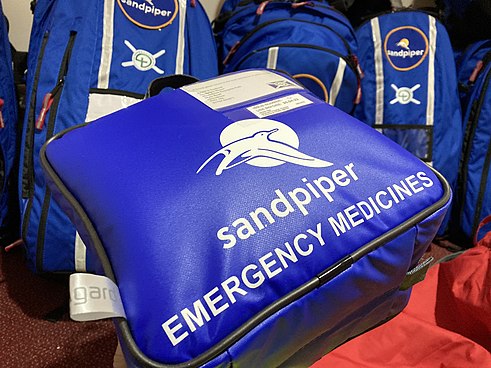
Emergency medical services (EMS), also known as ambulance services or paramedic services, are emergency services that provide urgent pre-hospital treatment and stabilisation for serious illness and injuries and transport to definitive care. They may also be known as a first aid squad, FAST squad, emergency squad, ambulance squad, ambulance corps, life squad or by other initialisms such as EMAS or EMARS.
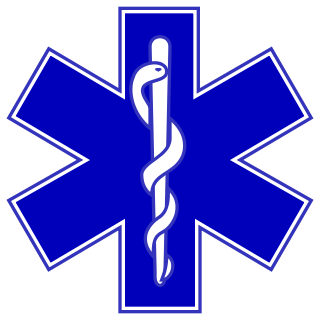
In the United States, the paramedic is a allied health professional whose primary focus is to provide advanced emergency medical care for patients who access Emergency Medical Services (EMS). This individual possesses the complex knowledge and skills necessary to provide patient care and transportation. Paramedics function as part of a comprehensive EMS response under physician medical direction. Paramedics often serve in a prehospital role, responding to Public safety answering point (9-1-1) calls in an ambulance. The paramedic serves as the initial entry point into the health care system. A standard requirement for state licensure involves successful completion of a nationally accredited Paramedic program at the certificate or associate degree level.
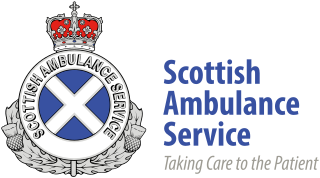
The Scottish Ambulance Service is part of NHS Scotland, which serves all of Scotland's population. The Scottish Ambulance Service is governed by a special health board and is funded directly by the Health and Social Care Directorates of the Scottish Government.

Yorkshire Ambulance Service NHS Trust (YAS) is the NHS ambulance service covering most of Yorkshire in England. It is one of ten NHS Ambulance Trusts providing England with emergency medical services as part of the National Health Service it receives direct government funding for its role.

Emergency medical services in the United Kingdom provide emergency care to people with acute illness or injury and are predominantly provided free at the point of use by the four National Health Services (NHS) of England, Scotland, Wales, and Northern Ireland. Emergency care including ambulance and emergency department treatment is only free to UK residents and a charge may be made to those not entitled to free NHS care.

Emergency medical personnel in the United Kingdom are people engaged in the provision of emergency medical services. This includes paramedics, emergency medical technicians and emergency care assistants. 'Paramedic' is a protected title, strictly regulated by the Health and Care Professions Council, although there is tendency for the public to use this term when referring to any member of ambulance staff.

The British Association for Immediate Care (BASICS) is an organisation which has the stated aim to encourage and aid the formation and extension of immediate care schemes. The British Association for Immediate Care was founded as a charity in 1977 and combines bringing people together who have an interest in pre-hospital immediate care with supporting and promoting regional and local immediate care schemes across the UK.
Resuscitation Council UK (RCUK) is a healthcare charity focused on resuscitation education and training for healthcare professionals and bystander CPR awareness for the public.
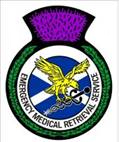
The Emergency Medical Retrieval Service (EMRS) is part of ScotSTAR retrieval service. The EMRS provides aeromedical critical care retrieval and pre-hospital care to people in Scotland in the form of two retrieval teams. The service provides patients in remote and rural areas with rapid access to the skills of a consultant or senior doctor in emergency medicine, intensive care medicine or anaesthesia, and facilitates transfers to larger, better equipped urban hospitals. The EMRS functions supplementary to the regular Scottish Ambulance Service Air Ambulance service. Unlike air ambulance services in other parts of the UK, EMRS has no dedicated aircraft but both EMRS North and West are funded by the Scottish Government. The EMRS has featured on the Channel 5 documentary series Highland Emergency, which charts the work of rescue services in the Scottish Highlands.

Lincolnshire Integrated Voluntary Emergency Service, known commonly as LIVES, is a registered charity staffed by volunteers providing pre-hospital care services across Lincolnshire. LIVES operates alongside the East Midlands Ambulance Service to provide clinical and critical care skills as well as immediate medical responses in the form of community first responders. LIVES operates under the national pre-hospital care co-ordinating body, the British Association for Immediate Care. LIVES is a registered provider of healthcare with the Care Quality Commission

The Suffolk Accident Rescue Service (SARS) is a registered charity supported by donations, which assists the East of England Ambulance Service NHS Trust in providing medical care at the scene of accidents and emergencies in Suffolk and surrounding counties. The organisation relies on volunteer medical professionals and Allied Health Professionals to provide this service on an entirely voluntary basis. The headquarters are in Woolpit. It is an affiliated member of the British Association for Immediate Care.
Essex & Herts Air Ambulance Trust (EHAAT) is a charity air ambulance service providing a free, life-saving Helicopter Emergency Medical Service (HEMS) for the critically ill and injured of Essex, Hertfordshire and surrounding areas.
Mercia Accident Rescue Service is a BASICS affiliated charity operation based on providing a fast-response, advanced medical team to back up the emergency services of the English counties of Herefordshire and Worcestershire. The charity aims to provide an organisational framework within which practitioners can be properly trained and equipped to provide prehospital care, its work is supported by local fundraising. MARS is staffed by a team of 11 doctors and two advanced clinical practitioners.
The West Midlands Central Accident, Resuscitation & Emergency (CARE) team is a charitable organisation who respond to serious medical incidents within the West Midlands, UK. Working in teams alongside West Midlands Ambulance Service, volunteer doctors, nurses and other healthcare professionals deliver enhanced critical care to seriously injured and unwell patients.
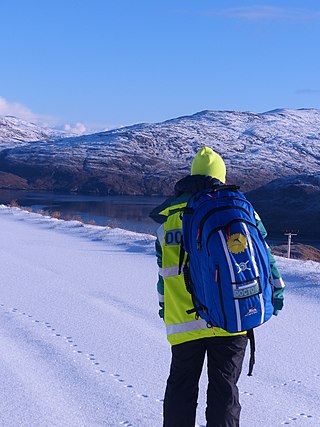
Pre-hospital emergency medicine, also referred to as pre-hospital care, immediate care, or emergency medical services medicine, is a medical subspecialty which focuses on caring for seriously ill or injured patients before they reach hospital, and during emergency transfer to hospital or between hospitals. It may be practised by physicians from various backgrounds such as anaesthesiology, emergency medicine, intensive care medicine and acute medicine, after they have completed initial training in their base specialty.
Scottish Specialist Transport and Retrieval (ScotSTAR) is the Scottish national service for adult, paediatric and neonatal patients. The service is run by the Scottish Ambulance Service and brings together NHS Scotland's three specialist transport and retrieval services: the Scottish Neonatal Transport Service (SNTS), the Transport of Critically Ill and Injured Children Service and the Emergency Medical Retrieval Service (EMRS). The service operates from a bespoke base near Glasgow and expects to be able to cater for 2,200 critically ill children and adults every year.
Intermediate Life Support (ILS) is a level of training undertaken in order to provide emergency medical care outside medical facilities. ILS is classed as mid-level emergency medical care provided by trained first responders who receive more training than basic life support providers, but less than advanced life support providers. Intermediate Life Support is also known as Limited Advanced Life Support (LALS), Immediate Life Support, or Intermediate Advanced Life Support (IALS).

The British Association for Immediate Care Scotland is an organisation involved with prehospital care. It has the aims of providing encouragement and aid with the formation of immediate care schemes and to provide training to support those working in prehospital care. It shares its origins with the British Association for Immediate Care (BASICS), which has UK wide coverage. In 1993, the British Association for Immediate Care began running prehospital care courses in Scotland, which were met with a warm welcome and it became clear there was a large audience for such education, especially in remote and rural areas of Scotland. This need for training and organisational leadership became clearer after the 1994 Scotland RAF Chinook crash on the Mull of Kintyre. This led to the training provided by BASICS to be modified for a more rural setting, and to the development of BASICS Scotland as a separate organisation in 2002.

Peter John Firth Baskett (1934–2008) was a Northern Irish physician, specializing in anaesthesia. He was responsible for the introduction of paramedics into the United Kingdom, created specialist ambulances for delivering on-scene pain relief to patients, and was the first chairman of the European Resuscitation Council.

The Prehospital Immediate Care and Trauma (PICT) Team is a prehospital care team which operates from Raigmore Hospital emergency department in Inverness, Scotland. It receives funding from NHS Highland, BASICS Scotland and the Scottish Trauma Network.



